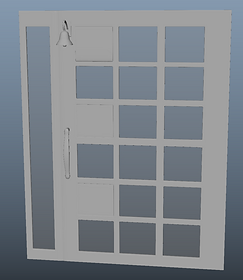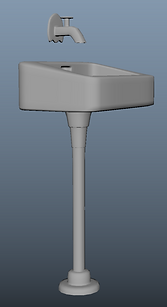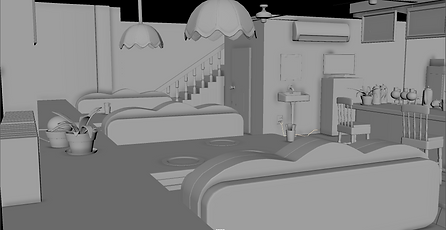top of page


Game Environment Project
The goal of this project was to digitally recreate a set from an existing video game and set it up in a game engine.
Planning
Our team had a wide variety of game genres we are interested in, many of which have their own unique genre. Because of this variety, we could not easily agree on a setting to replicate. We were able to collectively agree on the LeBlanc Café that can be seen in the Persona 5 video game franchise. This setting was perfect as it is a contained, finite area and would only require few or no procedural textures.
Modeling
As a scene with many objects highlighted, there is no true hero asset. For this project, I was in charge of modeling the booth lamps, air conditioner, mirror, porcelain sink, ceiling fans, tv, coffee grinder, clock, stairs, front door, plants, picture frames, wall divider, curtain, plastic dish bin, the dish towel inside, and the building. The camera in the game has a locked position when in this building, limiting the view, so I took snapshots from of the angles it offered and matched the perspective through a camera in Maya to make modeling the props easier. I initially breezed through my models, being so concerned about our scene's polygon count that I only used just enough to get the overall shape, before duplicating and altering it to create a smoother, higher polygon version. This occurred mostly with the booth lights; I wanted it done mostly with textures but realized it would benefit from a more solidly developed mesh. Once a majority of our models were completed, I began creating the building around the models once they were set dressed. I used the bar model as an anchor point, matched the perspective of a specific reference image, and then placed models around as shown in the image. I would then switch images, match the perspective again, and fill in as needed. The exact dimensions of the building were tricky to determine due to the limited movement of the camera, however I was able to build around the models and use reference as guidance.


















Texturing
I am stronger in modeling than texturing, so I tried to pick assets that needed little detail so the more experienced surfacers could focus on other textures. I was responsible for the bar lights, booth lights, mirror, tv, glass coffee maker, wooden floor, plants, picture frames, the dish bin and towel, and the curtain. Because my main focus was on the booth lamps, I was able to learn how to texture glass and set it up in Unreal Engine.









Set Up and Lighting
I was in charge of set dressing, as I was familiar with the game and already had some experience set dressing. I would import models into the scene in Maya to begin placing models and checking their relative scales. One of my group mates imported my set dressing into Unreal Engine and fixed their collision boxes. I was in charge of importing a majority of our textures in and creating the materials. Some models were dressed before they were UV unwrapped, so the FBX models would have to be reimported and dressed again.
I was responsible for the lighting of the booth lamps since the colored glass was prone to being washed out or appearing completely transparent. I was able to get around this by upping the roughness of the glass while keeping the opacity low, and placing a spotlight above to show off the colors. Next there is a point light a bit below the lamp acting as the lamp's light shining on the table. It had to be translated down, opposed to being placed in the lamp's light bulb, as to not wash out the interior of the lamp.




Group Mates Blogs
Jolena: Persona 5 - Leblanc Café
Jonathan: Persona 5 Café
Sarah: Café Leblanc
Shelby: Game Environment
bottom of page

